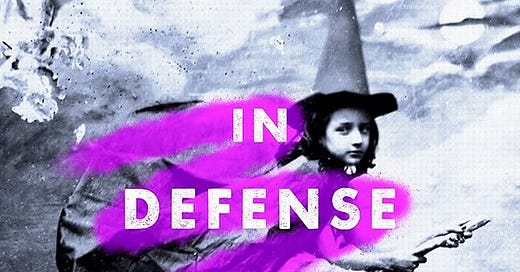review: in defense of witches
Title: In Defense of Witches: The Legacy of the Witch Hunts and Why Women Are Still on Trial
Series: N/A
Author: Mona Chollet
Translator: Sophie R. Lewis
Genres: Nonfiction, History, Feminism
Publishing Date: 8 March 2022
Original Language: French
Pages: ~304
CW: Misogyny, Sexual violence, Sexism, Sexual assault, Abortion, Miscarriage, Pregnancy, Lesbophobia, Domestic abuse
My Rating: 3 / 5
How is the legacy of the witch hunts still affecting us today? This is the question the author is addressing in this nonfiction book. Mona Chollet uses the witch as a stand-in for women across history, and explores how the misogyny that fueled the murder of so many women is still manifesting in oppression in modern times. The stories of individual women from history are woven in with more broad concepts and social issues, including marriage, motherhood, women’s careers, and more. Particularly, the book explores how society punishes women who step outside of their expected roles and behaviors, and how this continues to happen now, and also how societal shaming is used to silence women who attempt to speak out against injustices. Something I learned was that during the European witch hunts, there were villages where nearly every woman was executed, effectively wiping out entire family lines.
The author does a great job interconnecting all of these concepts and tidbits of history into a really good overview of women’s changing roles in society. However, even though there are a lot of very serious topics, the book flows nicely and is easy to read. It does not feel like you’re reading a textbook.
I think that this would be a great starting place for those who are starting to delve into these topics, since it gives a nice broad overview. For me, since I have read a lot of nonfiction regarding feminism and patriarchy, there wasn’t as much new information there for me. When I went into it, I was expecting the book to go into deeper detail about witchcraft and the witch trials. While the book does mention these topics quite a bit, it’s more about the connection to modern life, and so it didn’t quite meet the expectations that I had going into it (which is not the book’s fault). This was a really well-written primer in the history of women’s oppression, and I would recommend it for anyone who is interested in these topics and is looking for a good place to dip their toes in.
“In the private sphere, in the street, at work and in Parliament, men can signal loud and clear the pleasure or displeasure occasioned them by the sight of women’s bodies or clothes, their weight or their age, without their own body or clothes, weight or age ever coming under fire.”




